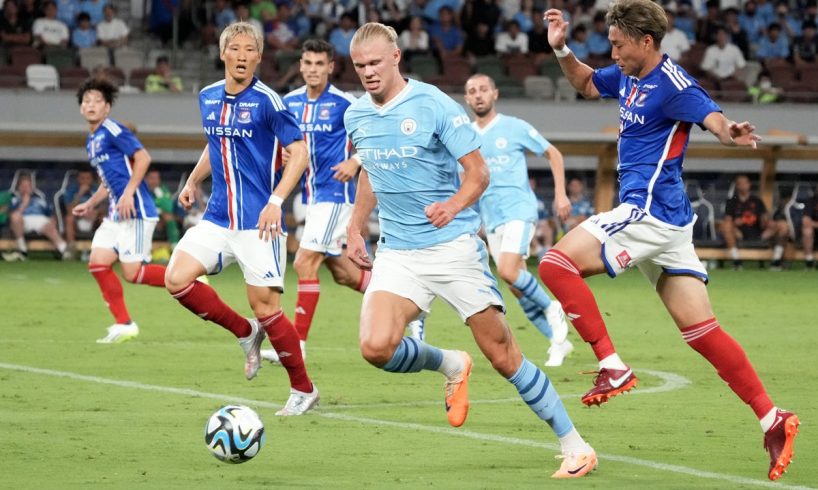
Manchester City and Yokohama F Marinos are owned by the City Group (Getty Images)
Uefa and Fifa are in a stand-off over regulation on multi-club ownership, as the two biggest confederations struggle to find a solution for one of the biggest issues facing football today.
The European body are pushing for Fifa to come up with rules before next year’s inaugural Club World Cup in the USA, especially with the possibility that it could feature clubs from multiple groups. Manchester City and Chelsea are both certain to be involved, as two examples, and the former are part of one of the biggest such groups in the world as City Football Group while the London club’s owners investigating the possibility of expanding beyond the recent purchase of Strasbourg.
Fifa are at the same pushing Uefa to clarify its own rules, that have so far led to situations like Leipzig and Salzburg – both from the Red Bull group – meeting in the Europa League. That is despite the rules notionally supposed to keep such teams apart to prevent conflict of interest. The two clubs were able to prove sufficient separation, which has left a consistent question over whether the regulations are fit for purpose.
Complications are based on two fundamental issues. One is that every single rule in football is based on clubs as separate entities.
Second is that Fifa have never fully defined what a club is.
Different confederations have different ideas, let alone different countries and it is understood to be a particular complication with the Asian Football Confederation due to how centralised sport is.
The Fifa statutes currently state:
“Clubs, leagues or any other groups affiliated to a member association shall be subordinate to and recognised by that member association” and that “every member association shall ensure that its affiliated clubs can take all decisions on any matters regarding membership independently of any external body. This obligation applies regardless of an affiliated club’s corporate structure. “In any case, the member association shall ensure that neither a natural nor a legal person (including holding companies and subsidiaries) exercises control in any manner whatsoever (in particular through a majority shareholding, a majority of voting rights, a majority of seats on the board of directors or any other form of economic dependence or control, etc) over more than one club whenever the integrity of any match or competition could be jeopardised.”
The fundamental problem, however, is that these groups cross multiple member associations, as well as confederations. That requires Fifa to take authority, since they are the only body with jurisdiction over everything any group can cover.
As part of the most headline-grabbing recent example, Saudi Arabia’s Public Investment Fund owns four clubs in the Saudi Pro League as well as Newcastle United, while looking at further opportunities in Europe.
The fear is that the situation has now grown to a level that is beyond regulatory control, since Uefa’s own landscaping report revealed that over 300 clubs across the world are involved in such groups.
RB Salzburg and RB Leipzig were in the same Europa League group in 2018/19 (Getty Images)
It is viewed within the game as a classic case of outside investors exploiting football’s rules to create a problem that is unfixable before regulators even realise. The great frustration for some staff within both Fifa and Uefa is that this was an issue seen as “a long time coming”, and there was an awareness it required regulation.
Uefa president Aleksander Ceferin has gone back and forth on the issue in statements over the last year, occasionally conceding the rules may be further loosened, but then recently admitting it is something to look at.
The groups create multiple potential tensions for football, from conflicts of interests to problems with transfers and loans, as well as the possibility of destabilising the transfer market. Above anything, however, there is the philosophical debate about individual clubs with proud histories having their identity subsumed, or existing purely to serve bigger brands as feeder clubs.
Fifa are currently in discussion about the rules for the new expanded Club World Cup next year, which will feature 32 clubs. While the expectation is that will not feature teams from the same group, there is an appreciation from the global body this is a huge issue that needs to be tackled head on – especially with the likely growth of bigger global competitions, which is very much part of Gianni Infantino’s plans.
Fifa want to speak to all stakeholders to get as rounded a view as possible, but that is likely to take considerable time.






